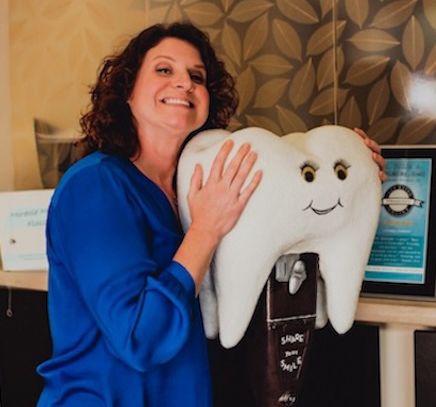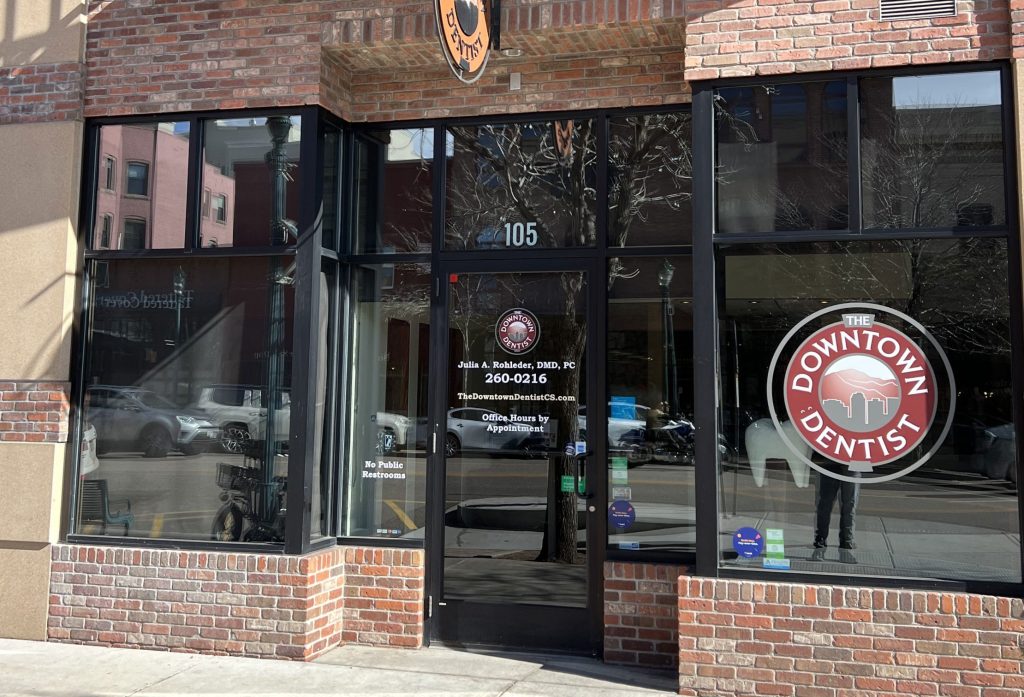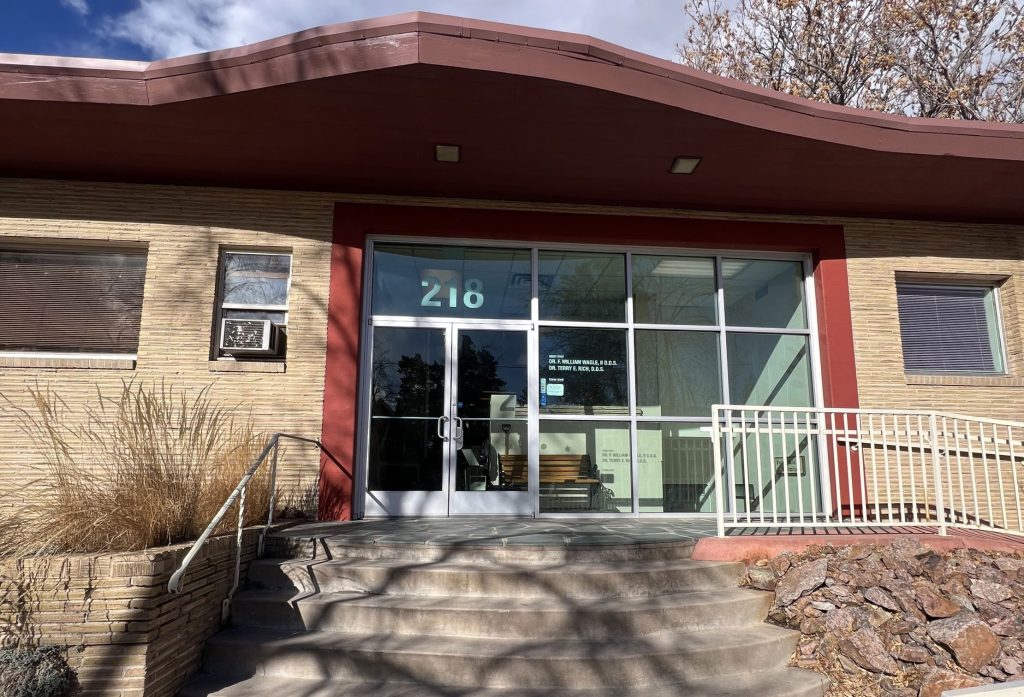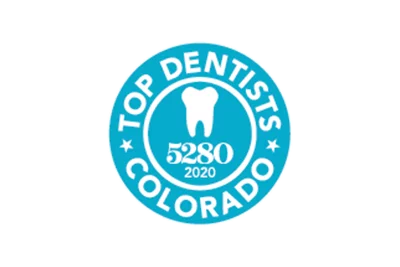Cracked Teeth

Cracked teeth are a common dental problem that can cause pain and discomfort. They occur when the surface of the tooth becomes damaged and develops a crack or fracture. Cracked teeth can vary in severity, from minor hairline fractures to more extensive cracks that extend into the tooth’s root. If left untreated, cracked teeth can lead to further dental problems, including infections and tooth loss.
Count on our team at The Downtown Dentist in downtown Colorado Springs for all your oral health needs.
Understanding Cracked Teeth
A cracked tooth is a dental condition where a visible or invisible fracture occurs on the tooth’s surface, affecting either the crown (visible part) or the root (below the gum line). This can expose inner layers, causing pain. Treatment varies based on severity, from no symptoms to deep cracks requiring extensive care. Early detection and treatment are crucial to prevent complications.
Why Do Teeth Crack? Common Causes
Cracked teeth can result from various causes, such as biting down on hard foods, excessive teeth grinding (bruxism), physical injuries, and large fillings. Preventive measures include avoiding hard foods, using a mouthguard for teeth grinding, and seeking dental care for large fillings to protect your teeth.
Identifying the Symptoms of Cracked Teeth
Cracked teeth can cause various symptoms, from mild discomfort to severe pain. It’s crucial to recognize these signs and seek dental care at The Downtown Dentist promptly if you experience them. Common symptoms of cracked teeth include pain while chewing or biting, sensitivity to hot or cold foods, swelling of the gums around the cracked tooth, and intermittent discomfort that is hard to locate. If you notice any of these symptoms, schedule an appointment with The Downtown Dentist for a diagnosis and treatment.
Physical Signs You Shouldn’t Ignore
When it comes to cracked teeth, watch out for visible cracks, gum swelling, fractured cusps, and sensitivity to hot or cold foods. These signs indicate the need for prompt dental treatment to prevent complications and extensive procedures.
Types of Cracked Teeth and Their Characteristics
Different cracked teeth have distinct characteristics and treatment options. Types include craze lines (superficial cracks on the enamel), fractured cusps (common around fillings), split teeth (may require removal of a part and restoration), and vertical root fractures (often requiring extraction). Treatment depends on the severity, determined through a dental examination.
Craze Lines: Superficial and Mostly Harmless
Craze lines are superficial cracks in tooth enamel, often caused by wear and tear. They are harmless and usually invisible, requiring no treatment unless for cosmetic reasons. Veneers can improve their appearance if desired but are not necessary for treatment.
Fractured Cusps: A Closer Look
A fractured cusp occurs when the chewing surface of a tooth breaks off, common around fillings. It can result from pressure like biting hard foods or opening packages. Symptoms include sensitivity or discomfort while chewing. Treatment involves a dental crown to restore shape and function, protecting the tooth from further damage. Severe cases may require a root canal treatment.
The Severity of a Split Tooth
A split tooth occurs when a crack extends from the crown to the root, splitting the tooth into multiple parts. Treatment varies based on severity: a dental crown can save it in mild cases, but extraction may be needed for severe splits. Untreated split teeth can lead to infections and loss; seeking prompt dental care is crucial. Treatment options may include root canal therapy, crowns, or extraction followed by replacement with implants if necessary.
Vertical Root Fractures: Hidden but Harmful
Vertical root fractures are cracks in the tooth root, often difficult to diagnose as they aren’t visible. They can cause pain and discomfort, typically starting at the root and extending towards the crown. Causes include trauma, dental procedures, or wear and tear. Symptoms may include pain, swelling, and sensitivity to pressure. Treatment options are limited; extraction may be necessary, with implants or bridges to replace the tooth. Early detection and treatment are vital in preventing complications.
Professional Diagnosis of Cracked Teeth
Diagnosing cracked teeth requires a professional evaluation from The Downtown Dentist, utilizing various tools and techniques. The exam will involve a visual inspection of teeth and gums, along with a review of symptoms and dental history. Radiographs or X-rays will detect hidden cracks or fractures. Dental exploring feels for rough edges on the tooth surface. A dental dye application highlights cracks. A thorough diagnosis is essential for determining the right treatment.
The Role of Dental X-Rays
Dental X-rays, also called radiographs, are essential for diagnosing cracked teeth. They can reveal fractures not visible to the naked eye, helping determine the extent of damage and identifying related issues like infection or decay. By providing detailed information on tooth structures, X-rays aid our team in making accurate diagnoses and developing treatment plans for cracked teeth.
Comprehensive Treatment Options
The severity and location of cracked teeth determine treatment options. Options include root canal treatment, dental care for maintenance, and tooth extraction in severe cases. The best treatment depends on factors like crack type, tooth health, and personal oral health goals.
When Bonding is the Answer
Bonding is a dental procedure for repairing minor cracks or chips in tooth enamel by applying a tooth-colored resin. It’s quick, non-invasive, and can be done in one dental visit. Suitable for minor cracks, it may not work for larger ones; other options like crowns or root canal therapy might be needed.
The Necessity of Dental Crowns
A dental crown is a cap placed over a cracked tooth to restore its shape, strength, and appearance. Made of materials like porcelain or ceramic matched to tooth color, it protects the entire tooth structure. The custom-made crown strengthens the tooth for normal chewing and biting by preventing further damage. During the procedure, the tooth is prepared by removing any damage or decay before placing the custom crown for restoration.
Root Canal Therapy: Saving Your Tooth
Root canal therapy treats cracked teeth by removing infected pulp and sealing the root canal to prevent further infection. It saves teeth from extraction and allows for restoration with a crown. The procedure involves numbing the area, removing damaged pulp, cleaning and shaping the root canal, filling it with biocompatible material, and sealing it. This treatment is highly effective in providing long-lasting relief from pain and discomfort.
Cases Necessitating Dental Implants
In cases of severely damaged teeth, extraction may be necessary. Dental implants are a long-term solution for tooth loss, consisting of a titanium post replacing the tooth root and a crown for natural appearance and function. Implants offer benefits like improved chewing, speech function, aesthetics, and durability, preventing complications associated with tooth loss.
Preventative Measures to Avoid Cracked Teeth
Preventing cracked teeth is crucial for good dental health. Follow these tips: Brush and floss regularly to prevent decay and gum disease; Be cautious with ice, hard candies, and unpopped popcorn kernels; Wear a mouthguard during risky activities like contact sports; Don’t use your teeth as tools.
Daily Dental Care Tips
Proper daily dental care is crucial for preventing cracked teeth and maintaining good oral health. Here are some tips for effective dental care:
- Brush your teeth at least twice a day: Use a soft-bristle toothbrush and fluoride toothpaste to remove plaque and food particles from your teeth and gums.
- Floss daily: Flossing helps clean the areas between your teeth that a toothbrush cannot reach, reducing the risk of tooth decay and gum disease.
- Use a mouthwash: Rinse your mouth with an antimicrobial mouthwash to kill bacteria and freshen your breath.
- Avoid tobacco and excessive alcohol consumption: Smoking and heavy alcohol consumption can increase the risk of dental problems, including cracked teeth.
- Maintain a healthy diet: Eat a balanced diet that includes plenty of fruits, vegetables, and calcium-rich foods to support strong and healthy teeth.
By incorporating these daily dental care habits into your routine, you can help prevent cracked teeth and maintain optimal oral health.
Protective Gear for Sports and Activities
If you participate in sports or activities that may pose a risk to your teeth, such as contact sports or extreme sports, it is important to wear protective gear to prevent cracked teeth. One essential piece of protective gear for teeth is a mouthguard.
A mouthguard is a custom-made or boil-and-bite device that fits over your teeth and gums and provides an extra layer of cushioning and protection. It helps absorb the impact of a blow to the face or mouth and reduces the risk of tooth fractures or loss.
Mouthguards are available in different types, including stock mouthguards, boil-and-bite mouthguards, and custom-made mouthguards. Custom-made mouthguards, which are made by a dentist, offer the best fit and protection.
Wearing a mouthguard during sports or activities can significantly reduce the risk of cracked teeth and other dental injuries. Consult with your dentist to determine the most suitable mouthguard for your needs.
Schedule a consultation, today
Understanding the causes, symptoms, and treatments for cracked teeth is crucial for maintaining optimal oral health. From identifying physical signs to exploring treatment options like bonding, dental crowns, root canal therapy, and dental implants, there are various ways to address cracked teeth based on their severity. By following preventative measures and seeking professional diagnosis when needed, you can prevent further damage and preserve your natural teeth. Remember, early intervention plays a key role in ensuring successful treatment outcomes and maintaining a healthy smile for years to come. Count on our team at The Downtown Dentist in downtown Colorado Springs for all your oral health needs. Schedule an appointment by calling (719) 260-0216 for our Tejon Street location or (719) 633-3711 for our Willamette Avenue location.

 Dr. Rohleder
Dr. Rohleder Meet the Team
Meet the Team Sterilization Protocol
Sterilization Protocol Frequently Asked Questions
Frequently Asked Questions Careers
Careers












